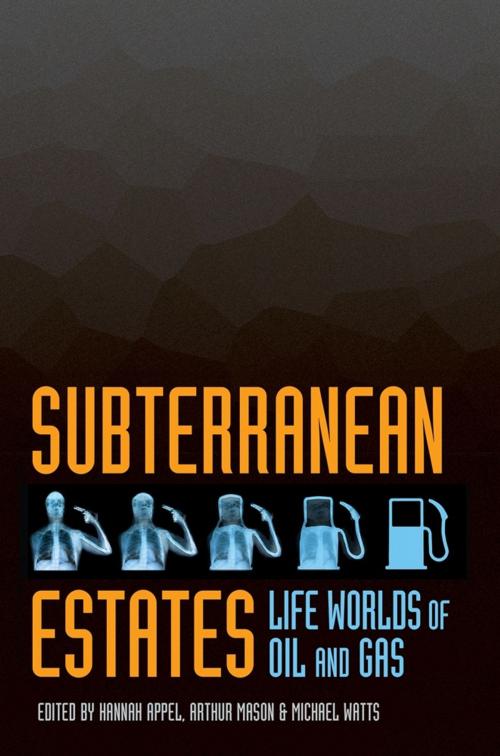Subterranean Estates
Life Worlds of Oil and Gas
Nonfiction, Science & Nature, Technology, Power Resources, Social & Cultural Studies, Social Science, Anthropology| Author: | ISBN: | 9780801455391 | |
| Publisher: | Cornell University Press | Publication: | June 24, 2015 |
| Imprint: | Cornell University Press | Language: | English |
| Author: | |
| ISBN: | 9780801455391 |
| Publisher: | Cornell University Press |
| Publication: | June 24, 2015 |
| Imprint: | Cornell University Press |
| Language: | English |
"Oil is a fairy tale, and, like every fairy tale, is a bit of a lie."—Ryzard Kapuscinski, Shah of Shahs
The scale and reach of the global oil and gas industry, valued at several trillions of dollars, is almost impossible to grasp. Despite its vast technical expertise and scientific sophistication, the industry betrays a startling degree of inexactitude and empirical disagreement about foundational questions of quantity, output, and price. As an industry typified by concentrated economic and political power, its operations are obscured by secrecy and security. Perhaps it is not surprising, then, that the social sciences typically approach oil as a metonym—of modernity, money, geopolitics, violence, corruption, curse, ur-commodity—rather than considering the daily life of the industry itself and of the hydrocarbons around which it is built.
Subterranean Estates gathers an interdisciplinary group of scholars and experts to instead provide a critical topography of the hydrocarbon industry, understood not solely as an assemblage of corporate forms but rather as an expansive and porous network of laborers and technologies, representation and expertise, and the ways of life oil and gas produce at points of extraction, production, marketing, consumption, and combustion. By accounting for oil as empirical and experiential, the contributors begin to demystify a commodity too often given almost demiurgic power.
Subterranean Estates shifts critical attention away from an exclusive focus on global oil firms toward often overlooked aspects of the industry, including insurance, finance, law, and the role of consultants and community organizations. Based on ethnographic research from around the world (Equatorial Guinea, Nigeria, Oman, the United States, Ecuador, Chad, the United Kingdom, Kazakhstan, Canada, Iran, and Russia), and featuring a photoessay on the lived experiences of those who inhabit a universe populated by oil rigs, pipelines, and gas flares, this innovative volume provides a new perspective on the material, symbolic, cultural, and social meanings of this multidimensional world.
"Oil is a fairy tale, and, like every fairy tale, is a bit of a lie."—Ryzard Kapuscinski, Shah of Shahs
The scale and reach of the global oil and gas industry, valued at several trillions of dollars, is almost impossible to grasp. Despite its vast technical expertise and scientific sophistication, the industry betrays a startling degree of inexactitude and empirical disagreement about foundational questions of quantity, output, and price. As an industry typified by concentrated economic and political power, its operations are obscured by secrecy and security. Perhaps it is not surprising, then, that the social sciences typically approach oil as a metonym—of modernity, money, geopolitics, violence, corruption, curse, ur-commodity—rather than considering the daily life of the industry itself and of the hydrocarbons around which it is built.
Subterranean Estates gathers an interdisciplinary group of scholars and experts to instead provide a critical topography of the hydrocarbon industry, understood not solely as an assemblage of corporate forms but rather as an expansive and porous network of laborers and technologies, representation and expertise, and the ways of life oil and gas produce at points of extraction, production, marketing, consumption, and combustion. By accounting for oil as empirical and experiential, the contributors begin to demystify a commodity too often given almost demiurgic power.
Subterranean Estates shifts critical attention away from an exclusive focus on global oil firms toward often overlooked aspects of the industry, including insurance, finance, law, and the role of consultants and community organizations. Based on ethnographic research from around the world (Equatorial Guinea, Nigeria, Oman, the United States, Ecuador, Chad, the United Kingdom, Kazakhstan, Canada, Iran, and Russia), and featuring a photoessay on the lived experiences of those who inhabit a universe populated by oil rigs, pipelines, and gas flares, this innovative volume provides a new perspective on the material, symbolic, cultural, and social meanings of this multidimensional world.















